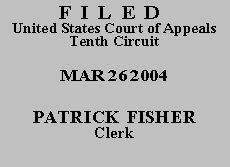

| RICHARD LEE BEAMS,
Plaintiff-Appellant, v. GALE NORTON, Secretary of the Department of Interior, Defendant-Appellee. |
|
We have jurisdiction over this appeal by virtue of 28 U.S.C. § 1291. We review the district court's summary judgment ruling de novo, applying the same legal standards as did that court to determine whether genuine issues of material fact exist and, if not, whether the nonmoving party is entitled to judgment as a matter of law. Simms v. Okla. ex rel. Dep't of Mental Health & Substance Abuse Servs., 165 F.3d 1321, 1326 (10th Cir. 1999). In the context of appellant's substantive claims, that means we consider his arguments in light of the familiar burden-shifting analysis based on the Supreme Court's decision in McDonnell Douglas Corp. v. Green, 411 U.S. 792 (1973). See Beams, 256 F. Supp. 2d at 1213, 1214 (setting out the general elements of prima facie cases alleging discriminatory failure to hire and retaliation) (citing Garcia v. Pueblo Country Club, 299 F.3d 1233, 1238 (10th Cir. 2002) and Pastran v. K-Mart Corp., 210 F.3d 1201, 1205 (10th Cir. 2000)). In our consideration of appellant's claims, we construe his pro se pleadings, including his appellate filings, liberally. See Cummings v. Evans, 161 F.3d 610, 613 (10th Cir. 1998). We will not, however, supply additional factual allegations to support appellant's complaint or construct legal theories on his behalf. Whitney v. New Mexico, 113 F.3d 1170, 1173-74 (10th Cir. 1997). Unsupported conclusory allegations do not create an issue of fact. See Matthiesen v. Banc One Mortgage Corp., 173 F.3d 1242, 1247 (10th Cir. 1999).
After careful review of the record on appeal and the parties' briefs, we conclude that the district court correctly decided this case. Further, appellant's arguments on appeal do not challenge the basis of the district court's rulings, namely that he had not demonstrated either the existence of a prima facie case or, where such case existed, had not presented evidence that the agency's articulated legitimate reasons for not hiring him were a pretext for discrimination or retaliation. To the extent that appellant's appellate arguments attempt to raise new claims based on the Indian Preference statute, 25 U.S.C. § 472, we decline to address them. Appellant's comments on Indian preference rules to the district court were made in the context of his discrimination claims and did not refer to the statute itself. Even under the liberal construction afforded pro se pleadings, these sparse references did not apprise that court of a separate claim based on the statute. We do not, as a general rule, address matters that were not presented to the district court. See Walker v. Mather (In re Walker), 959 F.2d 894, 896 (10th Cir. 1992).
Appellant also challenges as error the district court's denial of his motion to amend the pretrial order with additional claims of employment discrimination. We review this decision for abuse of discretion only. Davey v. Lockheed Martin Corp., 301 F.3d 1204, 1208 (10th Cir. 2002). We find no abuse of discretion in the district court's conclusion that the addition of new claims would prejudice defendant in this case, and appellant does not argue otherwise.
The judgment of the district court is AFFIRMED.
Entered for the Court
Circuit Judge
*. This order and judgment is not binding precedent, except under the doctrines of law of the case, res judicata, and collateral estoppel. The court generally disfavors the citation of orders and judgments; nevertheless, an order and judgment may be cited under the terms and conditions of 10th Cir. R. 36.3.
1. After examining the briefs and appellate record, this panel has determined unanimously that oral argument would not materially assist the determination of this appeal. See Fed. R. App. P. 34(a)(2); 10th Cir. R. 34.1(G). The case is therefore ordered submitted without oral argument.